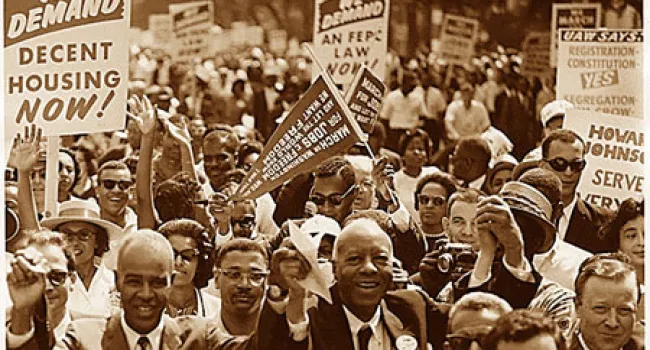
In 1955, Rosa Parks, a seamstress living in Montgomery, Alabama, wanted to peacefully demonstrate what civil rights meant to her. She was arrested for sitting at the front of the bus, a place reserved for white people only. Dr. King came to help her because he believed that everyone should have the right to use the buses. In order to raise awareness for this problem, he organized a peaceful protest of segregated buses that lasted 382 days. The protest led to a Supreme Court decision that said segregated buses were unlawful. Because of this success, Dr. King became known as a leader of the civil rights movement.
"Memories of our lives, of our works and our deeds will continue in others." - Rosa Parks
Rosa Parks and Dr. King inspired a boycott of buses to protest segregation in Alabama.
Rosa Parks died in 2005.
Standards
- 5.4.CE Analyze the causes and impacts of social movements in the U.S. and South Carolina.
- 8.5.E Utilize a variety of primary and secondary sources to analyze multiple perspectives on the cultural changes in South Carolina and the U.S.
- This indicator was developed to encourage inquiry into thematic continuities and changes into how marginalized groups sought and won legal rights. Inquiry into the leadership, methods, and outcomes of modern equal rights movements are supported by this indicator.
En 1955, Rosa Parks, una costurera que vivía en Montgomery, Alabama, quería demostrar pacíficamente lo que los Derechos Civiles significaban para ella. Fue arrestada por sentarse en la parte delantera del autobús, un lugar reservado sólo para blancos. King vino a ayudarla porque creía que todo el mundo debería tener derecho a usar los autobuses. Con el fin de crear conciencia sobre este problema, organizó una protesta pacífica de autobuses segregados que duró 382 días. La protesta condujo a una decisión de la Corte Suprema que decía que los autobuses segregados eran ilegales. Debido a este éxito, el Dr. King se hizo conocido como un líder del movimiento por los Derechos Civiles.
"Los recuerdos de nuestras vidas, de nuestras obras y de nuestras obras continuarán en los demás." - Rosa Parks
Rosa Parks y el Dr. King inspiraron un boicoteo de autobuses para protestar contra la segregación en Alabama.
Rosa Parks murió en 2005.




